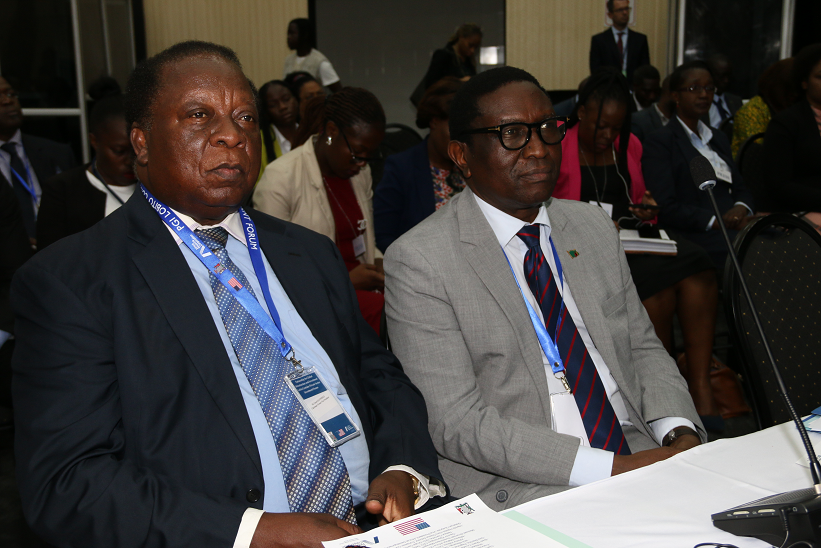By Shilika Chulu and Bupe Sendwe
The Lobito Corridor owes its very existence to the Benguela Railway. It was initially built by the British businessman Robert Williams between 1902 and 1929, and served as a crucial outlet to the sea to export minerals from what was the then Belgian Congo.
Today, it remains an important transport line that connects the inland areas of Angola, mining regions in the Democratic Republic of Congo (DRCs) Katanga Province and Zambia’s resource-rich North-western Province which will have direct access to Lobito port once the Lobito project comes to fruition.
It covers a vast region between Angola’s Atlantic Coast, the (DRC) and Zambia. The Corridor offers the shortest route to the seaport for its inland neighbours. In this regard, infrastructure improvements along the Lobito Corridor are considered imperative for furthering shared economic interests among the three countries, especially potential for growth in trans-regional trade.
The over 1,300 kilometre single-track railway extends from Lobito to Luau in Angola and crosses over into the DRC to the Congolese mining hub of Kolwezi. Additionally, a branch line will connect Moxico province in Angola to Jimbe at the Angola-Zambia border and extend to Solwezi.
The trans-boundary nature of the corridor has seen close cooperation amongst the governments of the three countries in order to coordinate infrastructure development and regulatory matters.
Intergovernmental negotiations over the Lobito Corridor Transport and Transit Facilitation Agreement (TTFA) have since been achieved.
On 27 January 2023, the TTFA was signed by the Ministers responsible for Transport and Corridor Development from Angola, DRC and Zambia with support and coordination of the secretariat of the Southern African Development Community (SADC).
The Lobito Corridor Transport and Transit Facilitation Agreement is expected to accelerate growth in domestic and cross-border trade along the corridor through the implementation of harmonised trade facilitation instruments, strengthening coordination of joint corridor development activities and fostering effective participation of small and medium enterprises (SMEs) in value chains.
In order to accelerate and strengthen private sector investments in the Lobito Corridor, on February 8, 2024, President Hakainde Hichilema, Senior Advisor to President Joe Biden, Amos Hochstein and President and Chief Executive Officer of the Africa Finance Corporation (AFC), Samaila Zubairu, convened the Partnership for Global Infrastructure and Investment (PGI) Lobito Corridor Private Sector Investment Forum in Lusaka.
The forum brought together more than 250 business executives, investors and financiers to discuss opportunities arising from the Lobito Corridor Project.
At the forum, President Hichilema described the development of the Lobito corridor as a once in a generation opportunity for the three countries and if managed well, the impact of the Lobito Corridor on the economies of the three countries will be dramatic.
Mr Hichilema pointed out that there will be great infrastructure development around the Lobito Corridor, saying that since the era of Cecil Rhodes and TAZARA, the Lobito rail line will be the most significant rail project, connecting from the Atlantic Ocean in Angola onto the Indian Ocean.
“For us three countries along this corridor, by opening up our hinterlands, we are going to open our communities to modernity,” he added.
He said the three countries will put together a coordination mechanism that will create a checklist that is time bound, adding that in order to put in place deliverables.
“We have enlisted the support of the African Finance Corporation (AFC), to structure the processes in an easy but effective manner,” he added.
And President Hichilema stressed the need to apply the best technology around the Lobito corridor, adding that joint ventures must be entered into leading to vested interests.
In addition, Mr Hochstein said that in 2022, his government and G7 leaders committed to deploy US$600 billion in an effort to start closing the global infrastructure gap in emerging markets.
Mr Hochstein thus indicated that it is time for action and time is of the essence, further disclosing that in 2023 alone, the US government announced about US$1 billion of investment in the Lobito Corridor across all sectors including a rail link across Angola that will serve as a backbone of connected infrastructure enabling greater region productivity and trade with local markets.
“This support includes 500 megawatts of solar power projects that will provide clean water and electricity to over a million homes,” he added.
Meanwhile, Africa Finance Corporation President Samaila Zubairu said the Lobito project is historic and precedent-setting in its ability to not only structurally transform Africa, but also deliver meaningful impact on a global scale.
Mr Zubairu charged that, for the project to succeed, it must be executed through an impact-centered lens and with speed.
“A lens that is fully committed to the highest environmental and social standards, diversifying supply chains for critical minerals and significantly reducing greenhouse emissions, local empowerment and optimized agricultural value chains among others,” said Zubairu.
With the immense business opportunities that the Corridor presents, the government is optimistic that Zambia is set to benefit through infrastructure development and private sector investments.
On the side-lines of the event, Minister of Transport and Logistics Frank Tayali said improving infrastructure is cardinal if the country is to benefit from trade promotion along the Corridor through a regional network adding that the project is a game changer.
“It is important that we showcase the fact that we are sitting on the best performing modern Corridor on the African continent,” said Mr Tayali.
He added that last year, Zambia accelerated from signing of the Lobito Corridor Transport and Transit Facilitation Agreement which has since moved to have it ratified and the instruments have been deposited with the SADC secretariat.
Angolan Minister of Transport Ricardo D’Abreu said that the forum signifies the hard work from the three countries to manage the Lobito Corridor and stressed the Corridor’s relevance and impact on the citizens of the three countries.
In agreement, President of the Zambia Association of Manufacturers (ZAM), Ashu Sagar said that the connectivity of the three countries is important in enhancing regional trade.
Once completed, the Lobito project is expected to spur economic growth and open new export revenue opportunities for Zambia’s and its wider north-west region.




